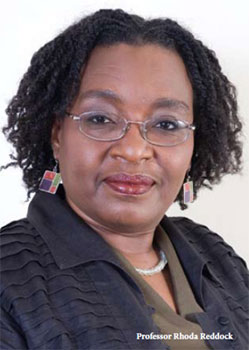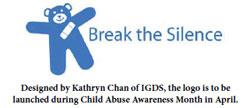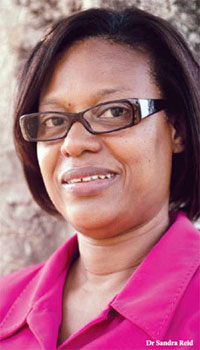How we are breaking the silence
By Professor Rhoda Reddock
 The Breaking the Silence Project is a component of a larger research programme of the Institute of Gender and Development Studies (IGDS): Gender, Sexuality and the Implications for HIV. The Breaking the Silence Project is a component of a larger research programme of the Institute of Gender and Development Studies (IGDS): Gender, Sexuality and the Implications for HIV.
It is a response to a request from stakeholders in the social and HIV sector for an understanding of the meanings underlying the practice of incest which they found was prevalent in the society yet not well researched, or understood.
The project is funded by the UN Trust Fund for the Elimination of Violence Against Women and UNICEF at around $US400,000, and is an action-research project and collaboration among a number of groups and organizations. Later this year, or early next year, a regional conference is planned to share the knowledge and the intervention model with others.
The research included a number of components:
- A study of agencies in Trinidad and Tobago who provide services related to health, children, HIV, social services, etc. The completed findings were presented to two workshops in January, one in Trinidad and one in Tobago.
- Ethnographic case studies in three communities—Aranguez, Toco and Charlotteville—on the meanings of incest in people’s lives.
- A review of children’s legislation with special emphasis on the legislation related to child sexual abuse and incest.
- A Community based intervention in the three communities.
The Community Intervention
In each community, liaison committees were established. These committees worked with the intervention team to decide on the appropriate interventions and to assist in their implementation. The intervention team was drawn from the Coalition Against Domestic Violence (CADV) – Tracie Rogers, Maureen Searles and Karima, IGDS – Tisha Nickenig, Keshan Lutchman and Arts In Action – Camille Quamina and Marvin George, who work with the communities to develop and organize these interventions.
 Interventions have, so far included setting up support groups for women survivors of child sexual abuse and incest (CSA/Incest) in two communities; a series of lunchtime teachers’ workshops on themes related to gender, sexuality and HIV and CSA/Incest. We have held cottage meetings on parenting, sexuality, and other topics and held health fairs in two communities; conducted theatre in education workshops among secondary school children, among other things. Interventions have, so far included setting up support groups for women survivors of child sexual abuse and incest (CSA/Incest) in two communities; a series of lunchtime teachers’ workshops on themes related to gender, sexuality and HIV and CSA/Incest. We have held cottage meetings on parenting, sexuality, and other topics and held health fairs in two communities; conducted theatre in education workshops among secondary school children, among other things.
All of these interventions were documented by note-takers as well as visually where consent was received to do so. We hope to produce a video on the methodology which was used in the research and another on the information gained in the research.
This project has been truly multi-sectoral with support coming from Arts in Action – providing theatre in education support. In all three communities as well, schools, religious bodies, NGOs, and women’s groups collaborated, likewise the Tobago House of Assembly through its various agencies.
Resource persons who give lectures and facilitated workshops have been drawn from the Rape Crisis Society, IGDS/UWI, UTT, The Ministry of Education Student Support Services Division, Ministry of Education, psychological, educational and gender experts, the Tobago Child and Adolescent Centre and the Tobago Gender Secretariat.
Uncovering hidden sexuality
 As co-creator of the ‘Breaking the Silence’ project, Dr Sandra Reid, a Lecturer in the Department of Psychiatry, School of Medicine, UWI. St Augustine is passionate about promoting understanding of the markedly deleterious effects of child sexual abuse. This initiative is part of the ‘Gender, Sexuality and Implications for HIV’ research Project, being conducted by The Institute for Gender and Development Studies (IGDS) directed by Professor Rhoda Reddock, Deputy Campus Principal of The UWI, St. Augustine. As co-creator of the ‘Breaking the Silence’ project, Dr Sandra Reid, a Lecturer in the Department of Psychiatry, School of Medicine, UWI. St Augustine is passionate about promoting understanding of the markedly deleterious effects of child sexual abuse. This initiative is part of the ‘Gender, Sexuality and Implications for HIV’ research Project, being conducted by The Institute for Gender and Development Studies (IGDS) directed by Professor Rhoda Reddock, Deputy Campus Principal of The UWI, St. Augustine.
The Gender, Sexuality and Implications for HIV programme grew out of the realisation that for change in sexual behaviour to occur to curb HIV transmission, “it was imperative to look at the factors that impact sexuality and sexual behaviours” explained Dr Reid, because one must understand what underlies sexual behaviour in the first place.
At the project’s regional conference an additional theme emerged. Dr Reid recalled that, “there was lots of interesting discussion, it was an opportunity for caregivers to share, and a recurring topic was child sexual abuse and incest.” Caregivers were reporting its prevalence, but there was no documentation or research. It was known that HIV statistics for children included an unspecified group for whom cause of infection was unknown and this new anecdotal evidence created a “powerful driving force.”
A hypothesis began to develop: child sexual abuse and incest needed to be understood and the link with HIV explored. This led to the Breaking the Silence project.
Dr Reid said that child sexual abuse and incest have been associated with some of her most painful care-giving experiences, “the hurt, the pain, the psychological trauma that attends child sexual abuse. Children are such innocent victims and they experience an intensity of trauma, which affects their life so potently.”
“It was startling to recognise how intricately woven child sexual abuse is into our culture’,” she said. Children are perceived as having no rights, females are held responsible for sexual advances, and communities accept this. Myths, alcohol and drugs also play a role in facilitating inappropriate behaviours. She was also surprised that “service providers themselves are not immune to the myths and stereotypes.”
The project team has been delighted by the willingness of both service providers and the community to reveal and share. For the first time in Trinidad and Tobago, an understanding of child sexual abuse and incest has been scientifically documented. Information and findings will now be disseminated to communities, service providers, policy and law-makers, and the wider Caribbean. Dr Reid is optimistic that the project has broken the silence, but acknowledges that to change behaviours, “the work has only just begun.”
|





